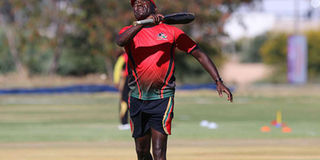When Tikolo spoke of Kenya’s cricket glory some 16 years ago

Steve Tikolo during a practice session. He was the captain of the Kenyan team that participated in the 2003 Cricket World Cup. PHOTO | FILE | NATION MEDIA GROUP
What you need to know:
- Tikolo suggested that Kenya cricket’s trip down the sewer was a result of its success — money poured in and it became the fruit that attracted the worst types of flies.
- In the 2007 Cricket World Cup, Kenya missed out on the Super Eight stage. It qualified for the 2011 Cricket World Cup but didn’t even win a single match.
Kenya’s best performance at the Cricket World Cup was in 2003, where they reached the semi-finals.
A few days ago, Steve Tikolo, considered one of Kenya’s greatest cricket players ever, was on the BBC’s “Sporting Witness” talking about 2003.
In a story later posted on its website with the title “Kenya’s World Cup cricket fairy-tale”, it says: “In 2003, Kenya stunned cricket by reaching the World Cup semi-final. Steve Tikolo was the Kenyan captain.”
The 2003 Cricket World Cup remains Kenya’s most glorious moment in international cricket.
ACHIEVEMENT
Says a Wikipedia entry: “The tournament was to be held in South Africa with Kenya hosting their two matches against Sri Lanka and New Zealand.
“The tournament started with a defeat to South Africa but Kenya bounced back with a four-wicket win over Canada in Cape Town. New Zealand forfeited their match against Kenya in Nairobi due to safety concerns but Sri Lanka did visit Nairobi and lost by 53 runs.
“The tournament continued, back in South Africa, with a win over Bangladesh and a defeat to the West Indies. Kenya had done enough to qualify for the Super Six stage, becoming the first non-Test nation to progress beyond the first round of the World Cup.
“The fairy-tale ended for the Kenyan team, the only non-Test-playing nation to ever make a World Cup semi-final… Kenya were bowled out for 179 (all out, 46.2 overs) with only Steve Tikolo (56 from 83 balls, 5 fours, 2 sixes) putting up any significant resistance.”
When it was all done, and the champagne toasts were a distant sound, the stardust remained in the air for a while.
Tikolo suggested that Kenya cricket’s trip down the sewer was a result of its success — money poured in and it became the fruit that attracted the worst types of flies.
NARC
I didn’t follow the 2003 Cricket World Cup much. I did, however, follow the response of Kenyans — especially those in the Nation newsroom — closely.
I was newly arrived in Nairobi. The cricket tournament happened at a significant time. Mwai Kibaki had been sworn in as President three months earlier, at the head of the National Rainbow Coalition (Narc).
Narc was the broadest democratic coalition to take power anywhere on the continent outside South Africa.
In the broad swathe of Central and East Africa, from the Red Sea to Maputo Bay, it was the first transfer of power to the opposition since Somalia’s first President Aden Abdulle Osman Daar was defeated in an election in 1967 and conceded graciously.
Daar became the first African leader to peacefully hand over power to a democratically elected successor.
After over 20 years of Daniel arap Moi’s rule, Kenya had slumped into despair and was a pale shadow of its old self — both righteously angry and its spirit broken too.
Moi’s departure and the defeat of his then-ruling Kanu party unleashed a wave of optimism and euphoria that left many light-hearted.
OPTIMISM
Opinion polls in 2003 consistently found Kenyans to be the most optimistic people on Planet Earth.
Many saw the sky as the start, not the limit. Narc hadn’t yet started to fall apart. As anti-corruption activist John Githongo was wont to say, the corruption networks were in disarray — but beginning to reorganise.
The ethnic entrepreneurs had been temporarily blind-sided by the progressive forces, but they, too, were beginning to mass at the gates.
The exploits of Kenyan cricket in 2003, therefore, were not only about sport.
They were also seen as testament to the possibilities that Kenya could rise to greatness again, and that the optimism wasn’t misplaced.
There was hysteria in the newsroom whenever Kenya won. I thought in football-crazy lands that was preserved only for “the beautiful game”.
DECLINE
I thought then that it was because cricket did something else. It was less “tribal”.
It was the cross junction where black, Asian, white and somewhere in between all those three Kenya met. In that sense, it represented a cosmopolitan Kenya. But also, like many sports played in white, a triumph of the elite.
The run didn’t last very long. In the 2007 Cricket World Cup, Kenya missed out on the Super Eight stage.
It qualified for the 2011 Cricket World Cup but didn’t even win a single match and was eliminated in the Group Stages. The lights went out.
I heard that 2003 roar in the newsroom for a couple of individual athlete’s exploits in the long distances but, as far as team sports go, it was inherited by Kenyan rugby.
Why did Kenyan cricket fizzle while rugby thrived? Part of the reason is in Tikolo’s hypothesis, that cricket was “eaten”.
It seems though that, unlike cricket, rugby played a different role in the difficult 1980s and ’90s: it was the soak pit for university student militant expression and a strange mix of a bonding and premating ritual. Its political roots run deeper.
Mr Onyango-Obbo is the publisher of Africapedia.com and explainer site Roguechiefs.com. @cobbo3





